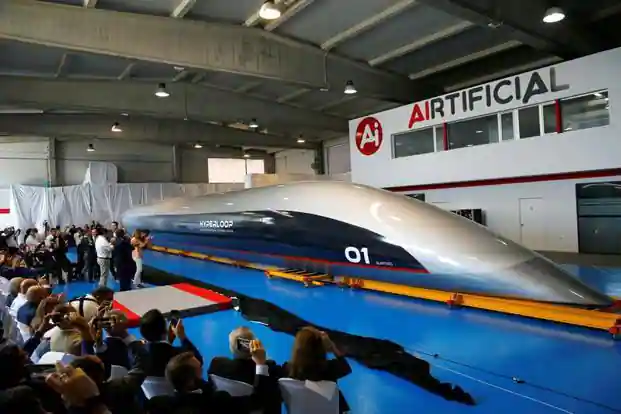Though the COVID-19 pandemic has slowed down new technology projects in the Gulf Cooperation Council countries, the work on Hyperloop transportation is on track.
Already, the Dubai government owned DP World has granted permit to Virgin Hyperloop, an American transportation technology company, to develop the technology that will allow people in the emirate to travel through the future transportation system by 2030
While the rest of the world is testing Hyperloop prototypes in low-vacuum environments, Virgin Hyperloop has tested the technology in a semi-vacuum climate, successfully operating the vehicle using electric propulsion and electromagnetic levitation.
In addition, the American company has developed a range of capsules that includes dynamic lighting and soft seats to relieve the impression of being trapped through close collaboration with Teague.
By 2025, the company aims to get the product certified. The XP-2, a capsule designed by Bjarke Ingels Group, was first tested out by Josh Giggle, chief technology officer and co-founder, and Sarah Lucian, director of the passenger’s experience.
However, Lux Research Inc., based in Boston, released a report last year stating that the developers of the innovative system were far too optimistic in predicting commercial operation by 2030. Their researchers say the technology is available to move passengers at up to 700 miles an hour in pods, but the lack of a certified test facility for government regulation and the high cost will delay development of the systems.
Emirates plans
The clean energy solution implemented by the UAE Virgin Hyperloop supports the federal government’s objective of increasing the use of clean energy to 50 percent of the total energy mix by 2050 while also decreasing the country’s carbon footprint by 70 percent and saving US$191bn by that year.
The Roads and Transport Authority (RTA) is getting closer to launching the world’s first hyperloop in Abu Dhabi and Dubai, reimagining the future of transportation. Dubai is well on its way to revealing the region’s first hyperloop project, Virgin Hyperloop One.
This multi-billion dollar project, also known as Hyperloop Dubai or the Virgin Hyperloop One, will reduce travel time between Dubai and Abu Dhabi from an hour or so to 12 minutes.
The concept made its premiere in the city in 2019 at the Dubai International Motor Show. The Virgin Hyperloop One passenger pods prototype, scaled to life size, was a show-stopper, giving guests a preview of the next generation of driverless transportation.
The projected completion date for the hyperloop in Dubai has yet to be determined.
Transporting 50 million passengers annually
It is predicted that the Hyperloop technology will carry between 45 and 50 million passengers yearly in the Arab Gulf states using clean and renewable energy instead of relying on either oil or gas. From all GCC countries, the journey time to Riyadh is likely to be around an hour.
This solar-powered capsule can reach speeds of over 1,000 km/h without producing any direct emissions.
Saudi Arabia has also announced it will develop the project. The country’s Ministry of Transport has signed a contract with Virgin Hyperloop One in 2020 for a preliminary study on the use of Hyperloop technology in transporting passengers and goods within the Kingdom.
According to Virgin Hyperloop, the project is estimated to create more than 124,000 jobs in Saudi Arabia and add US$4bn to Saudi GDP by 2030.
What is hyperloop technology?
Hyperloop technology is up to 4 times faster in transportation, up to 60 percent cheaper and is more sustainable and biodegradable. However, a Ohio study recently concluded that the Virgin Hyperloop fares would be more akin to the cost of driving, rather than flying.
The hyperloop will comprise the elevated, circular disc conveyors that can carry up to 28 people using vacuum tubes. The vehicles stand one behind another in the transportation tube. Then, within milliseconds and regulated by intelligent software built by the Virgin Hyperloop, the vehicle would move.








